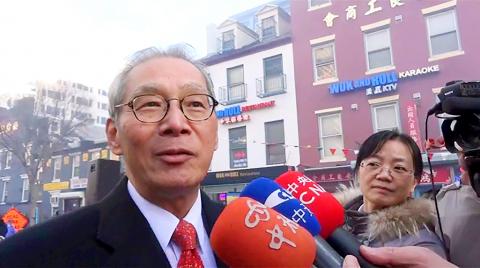Communications between Taiwan and the US remain smooth and bilateral relations strong, despite a US official’s comment that the US does not recognize the Republic of China (ROC) as a nation, Representative to the US Stanley Kao (高碩泰) said on Sunday.
Kao said the ROC’s status as an independent, sovereign state is a fact and the “status quo.”
“Communications between Taiwan and the US over the matter have been smooth as we have expressed our stance and they clearly understand it,” he said.

Photo: CNA
The government will continue to defend the nation’s democratic values and way of life, Kao added.
He was responding to a comment by Susan Thornton reiterating Washington’s stance of recognizing the People’s Republic of China instead of the ROC.
At her confirmation hearing in the US Senate for the post of assistant secretary for East Asia and the Pacific, Thornton was asked by US Senator Marco Rubio about the recent removal of the ROC national flag from a US Department of State Web site.
Thornton said the flag was removed because the US does not recognize Taiwan as an independent country.
“Our policy is to not display the flag of the ROC on US official government Web sites,” she said.
While reaffirming Taiwan’s sovereignty, Kao said the two sides should move beyond the issue and look further into the future.
Taiwan-US ties have progressed significantly based on the US’ Taiwan Relations Act and the “six assurances,” Kao said, expressing confidence that bilateral relations would only grow stronger.
Kao was speaking on the sidelines of a Lunar New Year celebration in Washington’s Chinatown.
Washington Mayor Muriel Bowser and Laura Stone, acting US deputy assistant secretary for the Department of State’s China, Mongolia and Taiwan Coordination, were also present at the event.

A car bomb killed a senior Russian general in southern Moscow yesterday morning, the latest high-profile army figure to be blown up in a blast that came just hours after Russian and Ukrainian delegates held separate talks in Miami on a plan to end the war. Kyiv has not commented on the incident, but Russian investigators said they were probing whether the blast was “linked” to “Ukrainian special forces.” The attack was similar to other assassinations of generals and pro-war figures that have either been claimed, or are widely believed to have been orchestrated, by Ukraine. Russian Lieutenant General Fanil Sarvarov, 56, head

SAFETY FIRST: Double the number of police were deployed at the Taipei Marathon, while other cities released plans to bolster public event safety Authorities across Taiwan have stepped up security measures ahead of Christmas and New Year events, following a knife and smoke bomb attack in Taipei on Friday that left four people dead and 11 injured. In a bid to prevent potential copycat incidents, police deployments have been expanded for large gatherings, transport hubs, and other crowded public spaces, according to official statements from police and city authorities. Taipei Mayor Chiang Wan-an (蔣萬安) said the city has “comprehensively raised security readiness” in crowded areas, increased police deployments with armed officers, and intensified patrols during weekends and nighttime hours. For large-scale events, security checkpoints and explosives

PUBLIC SAFETY: The premier said that security would be tightened in transport hubs, while President Lai commended the public for their bravery The government is to deploy more police, including rapid response units, in crowded public areas to ensure a swift response to any threats, President William Lai (賴清德) said yesterday after a knife attack killed three people and injured 11 in Taipei the previous day. Lai made the remarks following a briefing by the National Police Agency on the progress of the investigation, saying that the attack underscored the importance of cooperation in public security between the central and local governments. The attack unfolded in the early evening on Friday around Taipei Main Station’s M7 exit and later near the Taipei MRT’s Zhongshan

REBUFFED: In response to Chinese criticism over recent arms sales, Washington urged Beijing to engage in meaningful dialogue instead of threats and intimidation Washington’s long-term commitment to Taiwan would not change, the US Department of State said yesterday, urging Beijing to stop pressuring Taiwan and engage in meaningful bilateral dialogues. The remarks came in response to a backlash from Beijing about Washington’s latest approval of arms sales to Taiwan. The US Defense Security Cooperation Agency said in a statement on Wednesday that the Taipei Economic and Cultural Representative Office in the US has asked to purchase an arms package, including Tactical Mission Network Software; AH-1W helicopter spare and repair parts; M109A7 self-propelled howitzers; HIMARS long range precision strike systems; tube-launched, optically tracked, wire-guided missiles; Javelin